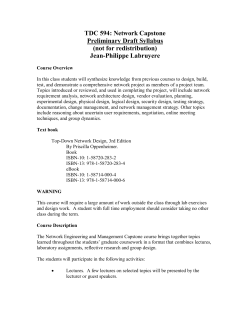
Course description RDM
Course description “Introduction to Research Data Management for Social Scientists” If you use or create data you need to take research data management seriously. Data itself is now seen as an asset in its own right. Not only are funding bodies pushing requirements related to retaining, sharing, and citing research data, journals are also requiring data underpinning publications be accessible to the research community. Therefore, you need to be aware of how to look after data from the planning stages of research, through the lifecycle of a project, and beyond. Taught by the CESSDA Training team at GESIS, this course covers the critical areas related to research data management: licensing and intellectual property, metadata and contextual description, obtaining informed consent for participation in research, anonymising research data for reuse, data storage, and data archiving. Teaching is delivered through a combination of presentations, exercises, discussions, and group work. Through the course, participants will have the opportunity to work on their own data management plan with respect to their research projects. Moreover, they will perform some practical exercises on data documentation using statistical software packages, such as Stata or SPSS. Target group Participants will find the course useful if they are social science researchers working with quantitative or qualitative data (principal Investigators, researchers who are parts of project teams, individual researchers, and PhD students). Learning objectives By the end of the course participants will: • • • • have gained a basic understanding of research data management in social science research (e.g. general rules, tools, role, benefits); be able to write and implement a research data management plan; be familiar with the roles and responsibilities of research staff with respect to research data management within the larger data lifecycle; be aware of data re-use in the social sciences and ways to enhance your own research. Prerequisites Participants should have basic knowledge of empirical research methods.
© Copyright 2025





















